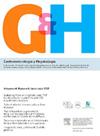Long-term outcomes of endoscopic ultrasound-guided pancreatic duct interventions: A single tertiary center experience
IF 2.2
4区 医学
Q3 GASTROENTEROLOGY & HEPATOLOGY
引用次数: 0
Abstract
Background and aims
Endoscopic ultrasound-guided pancreatic duct intervention (EUS-PDI) is one of the most technically challenging procedures. There remains a knowledge gap due to its rarity. The aim is to report the accumulated EUS-PDI experience in a tertiary center.
Methods
Single tertiary center, retrospective cohort study of prospectively collected data during the study period, from January 2013 to June 2021.
Results
In total, 14 patients (85% male; mean age, 61 years, range 37–81) and 25 EUS-PDI procedures for unsuccessful endoscopic retrograde pancreatography (ERP) were included. Principal etiology was chronic pancreatitis with pancreatic duct obstruction (78%). EUS-guided assisted (colorant and/or guidewire, rendezvous) ERP was performed in 14/25 (56%); and transmural drainage in 11 procedures, including pancreaticogastrosmy in 9/25 (36%) and pancreaticoduodenostomy in 2/25 (8%). Overall technical and clinical success was 78.5% (11/14). Three (21%) patients required a second procedure with success in all cases. Two failed cases required surgery. Three (21%) adverse events (AEs) were noted (fever, n = 1; perforation, n = 1; pancreatitis, n = 1). Patients underwent a median of 58 months (range 24–108) follow-up procedures for re-stenting. Spontaneous stent migration was detected in 50% of cases.
Conclusions
EUS-PDI is an effective salvage therapy for unsuccessful ERP, although 21% of patients may still experience AEs. In case of EUS-guided rendezvous failure, it can cross over to a transmural drainage.
内镜超声引导下胰管介入治疗的长期疗效:一家三级中心的经验。
背景和目的:内镜超声引导下胰管介入治疗(EUS-PDI)是技术上最具挑战性的手术之一。由于其罕见性,目前仍存在知识空白。本文旨在报告一家三级中心积累的 EUS-PDI 经验:单一三级中心,对研究期间(2013 年 1 月至 2021 年 6 月)前瞻性收集的数据进行回顾性队列研究:共纳入 14 名患者(85% 为男性;平均年龄为 61 岁,年龄范围为 37-81 岁)和 25 例内镜逆行胰腺造影(ERP)不成功的 EUS-PDI 手术。主要病因是伴有胰管阻塞的慢性胰腺炎(78%)。14/25(56%)例进行了 EUS 引导辅助(着色剂和/或导丝、会合)ERP;11 例进行了经壁引流,包括 9/25(36%)例的胰胃切除术和 2/25(8%)例的胰十二指肠造口术。总体技术和临床成功率为 78.5%(11/14)。3名患者(21%)需要进行第二次手术,所有病例均获得成功。两个失败病例需要进行手术。3例(21%)患者出现不良反应(发烧,n=1;穿孔,n=1;胰腺炎,n=1)。患者接受了中位数为 58 个月(24-108 个月)的再支架随访手术。50%的病例检测到支架自发移位:结论:尽管21%的患者仍可能出现AEs,但EUS-PDI是ERP不成功的有效挽救疗法。在 EUS 引导下交会失败的情况下,可以采用经壁引流。
本文章由计算机程序翻译,如有差异,请以英文原文为准。
求助全文
约1分钟内获得全文
求助全文
来源期刊

Gastroenterologia y hepatologia
GASTROENTEROLOGY & HEPATOLOGY-
CiteScore
1.50
自引率
10.50%
发文量
147
审稿时长
48 days
期刊介绍:
Gastroenterology and Hepatology is the first journal to cover the latest advances in pathology of the gastrointestinal tract, liver, pancreas, and bile ducts, making it an indispensable tool for gastroenterologists, hepatologists, internists and general practitioners.
 求助内容:
求助内容: 应助结果提醒方式:
应助结果提醒方式:


